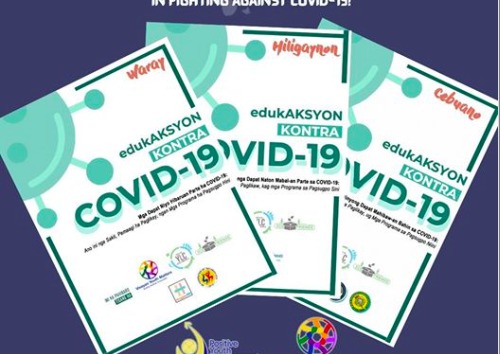MANILA, Philippines — As misinformation and disinformation on COVID-19 spread at an alarming rate, a network of youth organizations in the Visayas region in the central Philippines has beefed up efforts to help local communities better understand the escalating pandemic.
Young leaders of the Visayan Youth Matters group in Cebu province have launched “EdukAKSYON Kontra COVID-19”, an information dissemination drive that attempts to combat falsehoods and simplify complex and significant information related to the global health crisis by translating it to local languages.
In an interview with the Inquirer, Executive Director Cris Bael said access to accurate information is a “matter of life and death” especially in the midst of public health emergencies, noting that some Visayans have lesser awareness on the contagion due to communication barriers.
“Important information pertaining to the pandemic is almost available most of the time in social media or television which poses two main issues in the aspect of risk communication. First, not everyone has the privilege to access to social media,” said Bael.
“Second, mainstream news channels use either English or Tagalog as their language which might compromise communicating crucial information about COVID-19 to non-native speakers especially here in the Visayas,” the movement’s founder added.
Health experts have always stood firm that correct information is crucial in battling the disease. Confusion also grows among the public as the government contradicts each other on the interpretation of COVID-19 data and definition of terminologies.
In its May 21 bulletin, the Department of Health in Central Visayas reported that there are 2,297 confirmed cases of the infection with 141 recoveries and 43 deaths in the region, making it the area outside Metro Manila with the highest COVID-19 patients.
Since the kickoff of the education campaign on March 12, Bael said the group, through its movement called #OneVisayas, has already distributed COVID-19 brochures to almost 4,000 families of varying sectors in the region, as of this writing.
The brochures, which are written in Hiligaynon, Kinaraya, Cebuano, and Waray vernaculars, contains all necessary and significant information about the pandemic including the nature of the deadly virus and the means of its transmission.
Basic steps on proper hand-washing and usage of face masks to avoid contracting the infection are also integrated into the campaign material. It also includes information that debunks common myths and misconceptions surrounding COVID-19.
Moreover, the brochure provides a guide on how to ask for financial assistance and other social aid, COVID-19 cases classifications, frequently asked questions on medical centers that are available for testing, coronavirus emergency contact numbers and hotlines, and quarantine checkpoint locations.
“Using an emphatic, accurate, and culturally-appropriate messaging is vital to protect vulnerable populations in times of a pandemic or emergency. Communicating for health means using simple and familiar words to the public,” Bael said.
The movement has also made partnerships with other youth-led organizations, Sangguniang Kabataan councils, and several industries all over the Visayas.
With the said partnerships, the information project has helped sectors such as the senior citizens, children, solo parents, persons with disabilities, and members of the LGBTQI+ community.
The group also tapped several pharmacies as partners where the public can avail of the EdukAKSYON Kontra COVID-19 brochures to keep their families healthy and connected.
It has as well widened its reach to village health frontliners, pedicab and habal-habal drivers, and to indigents and families living in remote households in some of the region’s mountainous provinces where access to electricity and signal is scarce.
“This makes health information understandable which translates to the public or non-expert audiences trust and act on the information. The more they understand, they are more likely to heed the guidance in the message conveyed,” the youth leader concluded.
KGA
For more news about the novel coronavirus click here.
What you need to know about Coronavirus.
For more information on COVID-19, call the DOH Hotline: (02) 86517800 local 1149/1150.
The Inquirer Foundation supports our healthcare frontliners and is still accepting cash donations to be deposited at Banco de Oro (BDO) current account #007960018860 or donate through PayMaya using this link .
